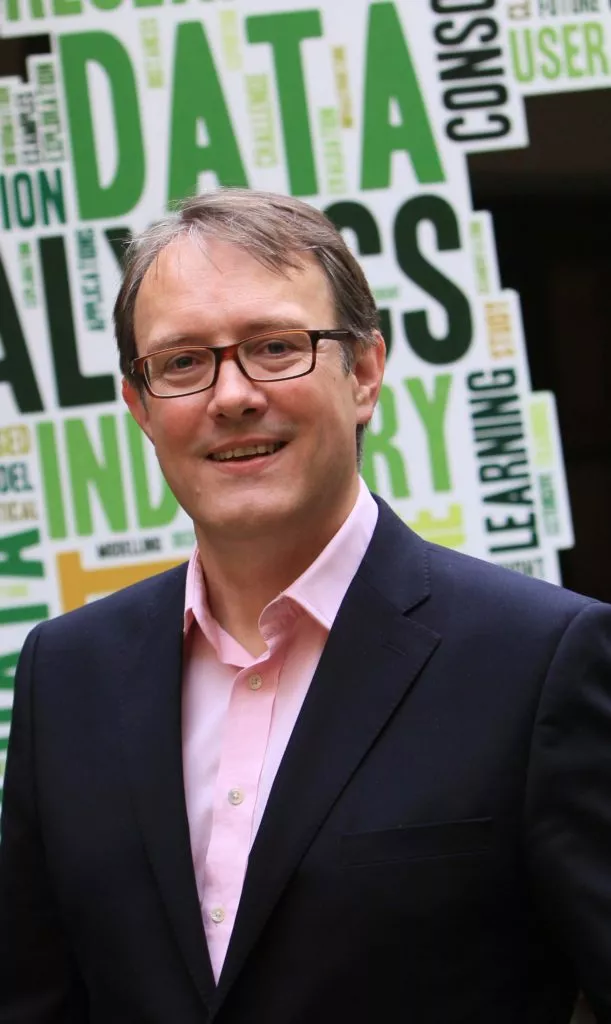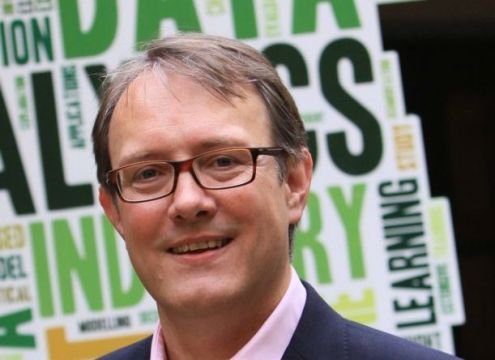Artificial Intelligence (AI) is not something to be feared and can help to improve the lives of Irish workers and businesses, according to the head of Ireland's centre for AI.
The recent suspension of a Google engineer who claimed a computer chatbot he was working on had become sentient made headlines across the world.
However, experts in the field have widely discredited the claims made by Blake Lemoine.
This was just the latest example of a story that stoked public fear and distrust in AI.
Edward McDonnell is centre director of CeADAR, Ireland’s national centre for Applied Data Analytics and Artificial Intelligence (AI).
He told BreakingNews.ie that advances in AI will be good for Irish people and businesses.
He said protections are necessary, but said stories like the Google chatbot are normally exaggerated.
"I’m afraid to say that there is often negative press around AI. That example of 1950s sci-fi movies, killer robots etc, it takes a lot to get that idea out of people’s heads.
"Like in 2001: A Space Odyessy, where the computer HAL becomes sentient and takes over the spaceship, again that makes a great story, and we all love a fright at the cinema, but I don’t think it’s ever going to happen.
"The recent story where the Google employee said the computer had the mind of a 7-year-old. That’s wrong, there’s no sentience in any computer. In a calculator if you type in 3 +2 and get 5, the calculator no more knows what 5 is, it can do the sum, but it doesn’t know what it represents. The same as a washing machine."
He added: "With every technological revolution, because it involves change and hopefully improvement, people are always unsure and there’s uncertainty. I’m sure when the agricultural revolution and industrial revolutions happened, everyone had similar worries. Computers are part of the wallpaper, a tool in the armery."
European Digital Innovation Hub
CeADAR is currently under consideration to be designated as a European Digital Innovation Hub (EDIH).
The European Union is investing over €700 million to co-fund an EU-wide network of hubs, with each one working to help demonstrate the benefits of AI to SMEs and help them implement it.
Mr McDonnell said this is something CeADAR already does, so becoming an EDIH would aid in this process.
He explained that the idea of EDIHs is to help demonstrate to businesses how AI can help them, as many (particularly SMEs) are still sceptical about it.
"One of the challenges that faces all SMEs, even in Germany, there’s a word ‘Mittelstand'... family businesses that are held up as being the backbone of Germany industry, it’s been noticed even they are slow to adopt AI and machine learning.
"This has been seen as a challenge in Europe so a while ago the idea of setting up European Digital Innovation Hubs (EDIHs) arose, it was quite a long involved, competitive process, which lasted a year and a half. They are partial results because there are two parties in Ireland involved in it - Enterprise Ireland and the European Commission - the European Commission part has said CeADAR will be the EDIH for AI in Ireland. That has to be ratified by Enterprise Ireland.
"The whole trust of the EDIH is to help companies, particularly SMEs, adopt AI."
He said there are different areas in which CeADAR can help companies, including skills and training and "test before invest".
"That means a company who may not have AI engineers or machine learning engineers or that infrastructure available, they can get us to do up a prototype for them," he explained. "They will be able to put their data into it and see the results and gauge for themselves, 'is this giving valuable insights?'"
Helping companies to upskill and "teaching senior decision makers" about AI are two other priorities, he said.
"The third element is to help those companies find investment. There are a lot of funding mechanisms and instruments out there but often companies are so heads down in day to day work that they’re not aware of what’s available, and Enterprise Ireland have a lot of supports, so we’d help companies apply, craft a proposal, get support and help them with work.
"The final one is to strengthen the network of EDIHs. They will be all around Europe and the number in a country will be dependent on the economic activity and the size.
"There’s going to be an element of the network, and introducing SMEs in Ireland to opportunities abroad and vice versa.
"It’s a nationwide initiative, we’ll be going to every county in Ireland. Not only offering advice on AI, what it is and what it can do, but also practical help for companies and those pillars of upskilling, making models available, supporting companies to find funding for their ideas, and if there’s interest connecting them with the wider ecosystem across Ireland and Europe."
One example of how AI can help average businesses that Mr McDonnell cited is helping to speed up, and sometimes automate, mundane tasks like paper work.
"One of the things that certainly AI and machine learning can do is the very monotonous tasks in terms of extracting information from forms, that was a manual process, nobody would deny that if you could get a machine to pull off a person’s name, address, PPS number, all that automatically, would be so much better than keying it in, those sorts of tasks."
Recent reports have claimed AI could soon be able to carry out tasks people find synonymous with human creativity, such as writing and art.
However, Mr McDonnell said this is very premature, adding that he feels it can offer a tool to aid this kind of work.
"There are foundational AI models, transformers, right at the cutting edge of AI. You can ask the systems to produce a painting in the style of whoever, and it can provide a good enough representation. Not to the quality of the original artist but something similar.
"That’s the stage where we’re at. There will be some job translation but not to the extent that some people believe it will be. By the same token, with social media, people were worried, but there are a lot of parts to it that are a force for good.
"There is a lot of disinformation out there."
Mr McDonnell feels the level of talent in Ireland means the country has a chance to become a world leader in AI.
"The European Union publish an innovation scoreboard ranking every country from the leading innovators. Ireland is consistently high up this table, we’re an innovative country, and we’ve had a long tradition of data science, big data and AI.
"We have an existing cadre of data scientists, engineers, and AI engineers coming through the systems, a lot involved in AI, analytics, data companies.
"The universities have been generating a lot of post graduates in AI. UCD has at least four or five master's degrees that incorporate AI; maths, science, business, social science... hundreds of graduates a year across Ireland.
"That’s what’s attracting multinationals because we have this talent."

Practical examples of the companies Mr McDonnell and CeADAR work with include technology that summarises large videos, optimising processes, and predicting when expensive machines will need to be repaired.
"One of the companies we’re helping summarises information. It takes hour long videos, finds a five-minute summary, technology can now automatically summarise documents and videos.
"We’re totally bombarded with content so summarising it like that is great. We help other companies with improving their process, the quality of service, let's say making widgets to reduce the number of errors.
"One of the big projects that worked well for us was being able to predict when machines will fail. One area was pumps on the ocean floor controlling oil flows, if you can tell a pump is going to fail two months before... AI can help with that.
"We worked with several Irish companies in the business of wind farms, so we can predict the power output days in advance because they want to be able to balance the generation of power."
He added: "Even mundane stuff, a marketing company might want its database of clients divided into different types.
"One that’s a bit different is we’re working with a company who make vertically climbing robots, they’re very small, but they have four big suckers so if you put it on a wall or metal surface it climbs up... it has a camera, and it looks for faults or flaws with a metal container, an aircraft body, things like that.
"We’re working with Mana, the drone delivery company, so working with them to help the drones navigate where to drop off deliveries... be that a pizza or whatever, and then go back again."
While concerns are often expressed about areas in AI such as facial recognition, which recently hit the headlines after plans for gardaí to use the technology, Mr McDonnell said safeguards and codes of practice will help regulate these areas.
"Obviously we have to be careful even looking at things like facial recognition and monitoring.
"That’s why I’m delighted to see the EU is bringing in regulatory frameworks to guard against negative and malevolent uses of the technology. It’s like a lot of things; it could potentially be used for good or bad and that’s why we need these regulatory frameworks in place that will disallow negative uses of facial recognition technology."

He added: "The problems with bias data, and problems like a judge’s assistant in the States who was biased against a particular group, so we have to be very careful in those aspects of AI.
"One of the hot topics in AI at the minute is trustworthy AI, and a big part of trustworthy AI is getting the AI system to explain how it came to a choice. Let’s say if you’re applying for a loan, the human has to say why and how it was correct, so it should be seen as an assistant tool rather than a determinant, so explainable AI is very important. It’s basically to take the lid off the black box and see what is going on."
Mr McDonnell predicts a bright future for AI, and he is keen to get the message across to businesses, even SMEs that may feel they are too small to benefit from it.
"At the simplest a small retailer down the country, one of the big words at the minute is digitalisation, encouraging companies to go online, have an online presence. Then when people interact with your website it can offer them different services they may be interested in.
"We'd encourage any business owner, no matter how small, to get in touch with us."







